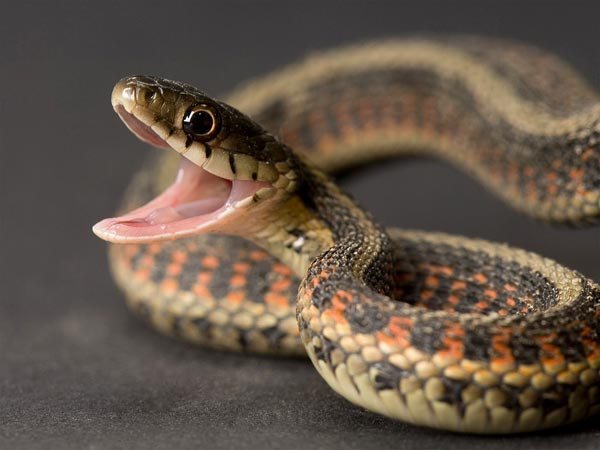
By Ephraims Sheyin, News Agency of Nigeria (NAN)
Massive deaths from snakebites have become a recurrent decimal in Nigeria.
The casualty figures usually get more staggering during the heat when these cold-blooded reptiles are forced out of their hiding places in search of fresh air.
That period, usually between January and April, is incidentally the time farmers go to the fields to clear their farms, preparatory to the farming season.
It is also the time herdsmen in the north move into thicker forests in their search for greener fields in view of the harsh realities of the dry season.
Records from various snakebite treatment centres across the country have also indicated that the figures go up during the harvest season, especially for crops like rice and yam.
According to a medic at the Zamko Comprehensive Medical Centre, Langtang, a snakebite treatment point in Plateau, rats go to yam farms to eat yam, snakes go to the farm to wait for the rats. When farmers reach their farms for the harvest, they get bitten.
During one of such peak snakebite periods last year, 250 victims died within three weeks in Plateau and Gombe states.
The figure represented the number of confirmed deaths in two snake treatment centres – General Hospital, Kaltungo, Gombe State, and Zamko Comprehensive Medical Centre. More victims were confirmed to have died at herbal treatment centres within the period.
States worst hit by the menace include Gombe, Bauchi, Taraba, Adamawa, Plateau, Borno, Nasarawa and Benue.
Nandul Durfa, Managing Director, Echitab Study Ltd Guarantee, the outfit handling the collection and distribution of Echitab Anti-Snake Venom (ASV), from their production centres in United Kingdom and Costa Rica, says that the situation has been particularly bad this year because of a paucity of the ASV.
“As at January, we had less than 200 vials left for the whole country. The report we get from the snakebite treatment centres is mind blogging, but there isn’t much we can do,’’ a hapless Mr Durfa told journalists in Jos recently.
He said that his outfit was expecting the next supply of 2,000 vials from Micropharm Ltd in Wales, UK, and another consignment from ICP University in Costa Rica, on April 22.
“Clearly, the nation is in trouble at this peak period of snakebite. The quantity in the store has proved too little to meet the demand. The situation is frightening.
“Already, the snakebite treatment centre at the General Hospital, Kaltungo, receives an average of 16 cases a day. That centre received more than 3,086 cases last year. The situation is even worse at the Zamko medical centre,’’ he said.
He regretted that not much attention was being paid to victims of snakebites, and blamed that on a claim that the victims of snakebite were mostly the poor people.
“Everyone should be interested in assisting victims of snakebites because those affected are mostly the productive group – the farmers, miners, hunters, youths and herdsmen – responsible for our food, milk, meat and other critical areas of the economy,’’ he posited.
But, with more Nigerians dying as a result of snakebite, analysts have continued to wonder why the shortage of the ASV has persisted over the years. They particularly wonder why Nigeria had yet to start producing the facility locally so as to make it readily available and affordable.
Mr Durfa says that the ASV is always in short supply because of the process involved in producing and ferrying it to Nigeria.
According to him, ASV comes in two forms – EchiTAB Plus ICP polyvalent, produced at the Instituto Clodomiro Picado, University of Costa Rica, which treats bites from all venomous snakes in Nigeria, and EchiTAB G, produced by Micropharm Ltd, United Kingdom, solely for carpet vipers, the commonest snakes in Nigeria.
Mr Durfa says that tedious processes, lasting more than three months, are involved in producing and importing the ASV.
“Normally, we take the live snakes to Liverpool School of Tropical Medicine where they are killed and their venom extracted and sent to the manufacturing sites in Wales and Costa Rica.
The drugs are produced there and brought to Nigeria.
“Aside the transport, the weather is different; we must ensure that the snakes are kept in a regulated temperature similar to what they are used to, in Nigeria, so that they will not die.
“If we produced at home, we shall ward off the heavy amounts paid in foreign exchange to technicians in the UK, because salaries are lower here,” he said.
Mr Durfa explained that local production of ASV would be “very easy” in Nigeria because the consultants had expressed their readiness to transfer the technology to the country.
“The consultants are willing to transfer the technology and also train local personnel to handle the processes. Nigeria must take full advantage of this kindness,” he stated.
He said that former President Olusegun Obasanjo approved the local manufacturing of the ASV in 2006, but regretted that nothing came of it.
“Obasanjo approved a production cost of N2 billion and suggested that the money be sourced from the Millennium Development Goals (MDGs) fund; sadly, no money was made available for the project.”
Mr Durfa further explained that EchiTAB ASV, whose name is sourced from Echis ocellatus – the biological name for carpet viper – with TAB referring to Therapeutic Anti-Bodies, had three variants including EchiTAB G for carpet vipers responsible for 97 per cent cases of snake bites in Nigeria, and EchiTAB Plus for carpet viper, Puff Adder and Black Cobra venom.
He traced the ASV’s production to 1991, when Prof. Ransome Kuti, then health minister, sought the assistance of two UK Professors – David Warrel of Oxford University and David Theakston of Liverpool School of Tropical Medicine.
“There was an acute shortage of ASV then, and the minister contacted the duo.
“The production processes went through various levels of screening and 11 clinical purification trials before the drugs were certified and registered by NAFDAC.
“The clinical trials were carried out in Kaltungo General Hospital, Gombe State, Zamko Comprehensive Health Centre, Langtang and Jos University Teaching Hospital,” he recalled.
He advised the government to pay special attention to local production of the drug because snake bites affect mostly the productive group, and regretted that many had continued to die from a menace that could be effectively tackled.
Mr Durfa suggested that the federal government could establish a factory to manufacture the drug using a Public-Private- Partnership (PPP), arrangement.
“The best arrangement is the PPP because government policies are usually unstable. One government can start a project that its successor may discard. That will take us back to square one.
“But if private hands are involved, continuity will be guaranteed,” he argued.
Durfa declared that snake bite was a menace that must be taken seriously because it was worse than Ebola, monkeypox and even HIV/AIDS.
“It happens mostly to the rural dwellers who stabilise the economy by farming. We cannot abandon them to face the consequences of heeding government’s call to return to the farm because that will not be good for the economy,” he said.
While reaffirming that the only way to make ASV readily available and affordable at all times, was for Nigeria to begin local production of the drug, he expressed dismay that Nigeria was still depending on foreign countries for ASV to neutralise poison from very common snakes like viper, cobra and puff adder.
“The only time we can have enough ASV to meet our rising demand is when we produce it locally. That is the only time we can determine our fate.
“The partners are ready and willing to transfer the technology for the production of the ASV, but Nigeria has not been forthcoming,’’ he lamented.
He said that the producing processes were always delayed because the producing centres have specific periods allocated to manufacturing the Nigerian variant of the ASV.
“No matter how pressed we are, we must wait for that period. The only way to make the drug readily available and cheap is to produce locally,’’ he said.
Abubakar Bala, the Snakebite Treatment Officer at the Kaltungo General Hospital, Gombe, equally presented a gory picture of the helpless situation and urged the federal government to take urgent measures to begin the local production of the ASV.
“The persistent shortage of ASV has reached a crisis level. Very often, we have had to watch helplessly, while patients gasp for breath. We cannot continue like this.
“It is a critical situation but we are helpless. We want the government to treat the issue as an emergency and a necessity. Government should equate the necessity of ASV with having an army, customs, police and other security agencies.
“The drug should be treated as a security issue. Every developing country should have its anti-snake venom manufacturing company.
“The other option is to have a reliable supply channel, with government subsidising the cost to avoid a major crisis like the types we suffer very often in Nigeria; in truth, we find it difficult and embarrassing to explain such situations to our patients.”
He advised the government to look for a long term solution to the scarcity by collaborating with private producers to manufacture the drug locally, via a technology transfer arrangement with Echitab producers in Costa Rica and the United Kingdom.
Titus Dajel, Medical Superintendent, Zamko Comprehensive Medical Centre, spoke in the same vein.
“There are many victims of snakebites, but the ASV is always in short supply.
“Government must act fast because traditional healers have taken advantage of the situation to extort monies from victims, with a promise to heal them.
“What the herbalists are doing is trial and error. Most victims bleed in the brain because the venom is vicious. Traditional healers cannot tackle that because they concentrate on healing the wound,” he explained.
Mr Dajel urged the federal government to treat snake bite as a national emergency and take urgent steps to make the anti-snake venom available.
“Importing is very dangerous, especially in view of the rising cost of the dollar. We must look into the possibility of domesticating the production of the drug to avoid constant crisis,” he said.
Tim Golu, whose Pankshin/Kanam/Kanke constituency in Plateau, is heavily hit by the snakebite menace, says he is “very uncomfortable’’ with the constant paucity of the ASV, adding that the situation had cost many lives “in the past few weeks’’.
“We have lost many people in the past few weeks. Right now, we have several cases in Kanke, my village,’’ he said.
Golu regretted that fake drugs were being sold to desperate victims, causing more deaths and deformities, and appealed to the federal, states and local governments to intervene by committing funds for the purchase of ASV.
The legislator said that he had initiated a bill for the establishment of a National Centre for Research and Production of Snake Vaccines, and expressed optimism that the bill would soon be passed into law to offer relief to snakebite victims in the country.
But Adamu Atiku, a specialist in human medicine, says that the first step to establishing a factory for the local production of ASV must start with the federal government declaring snakebites as a national emergency in view of its prevalence.
“When government does that, it will give special attention to the menace and adopt measures to curb it. One of such measures will naturally include the local production of ASV.
“If the federal government demonstrates the political will to establish an ASV producing outfit, the National Assembly will be compelled to see the need for a special vote for that special project,’’ he stated.
With the government paying more attention to the agricultural and mining sectors so as to diversify the economy, analysts say that Nigeria cannot afford to ignore a major menace associated with the two industries – rising prevalence of snake bites.
They particularly note that the victims of the reptiles are active members of the society on the fields to actualise that goal, and urge government to urgently begin the local production of ASV to reduce its cost and ensure steady supply, so as to end the vicious cycle of snakebite deaths that had become a daily routine in the country.
You may be interested

My Goal Was To Achieve Success With Ten Hag At Man United –De Ligt
Webby - November 14, 2024Netherlands international Matthijs de Ligt has suggested Erik ten Hag didn’t get the breaks he needed to keep his job…

I Want To Take My Game To New Level –Lookman
Webby - November 13, 2024Super Eagles winger Ademola Lookman has reiterated his commitment to take his game to the next level.The Nigerian international, who…

AFCON 2025Q: Benin Republic Hit By Another Injury Blow
Webby - November 13, 2024Benin Republic will be without two more players for their 2025 Africa Cup of Nations qualifying matches against Nigeria and…






















![American Pastor, David Wilson Seen Eating The Box Of Woman Who Isn’t His Wife [Video]](https://onlinenigeria.com/wp-content/uploads/2019/10/american-pastor-david-wilson-seen-eating-the-box-of-woman-who-isnt-his-wife-video-150x150.jpg)









